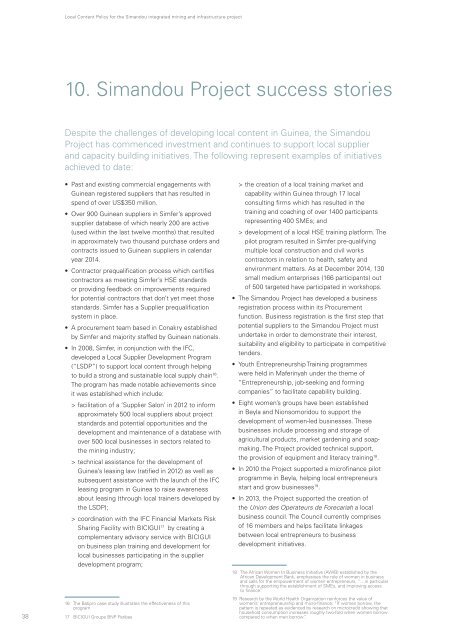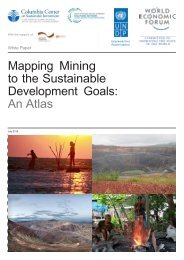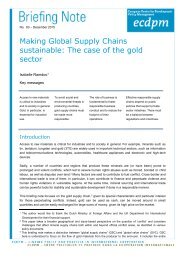20Nwews
20Nwews
20Nwews
You also want an ePaper? Increase the reach of your titles
YUMPU automatically turns print PDFs into web optimized ePapers that Google loves.
Local Content Policy for the Simandou integrated mining and infrastructure project<br />
10. Simandou Project success stories<br />
Despite the challenges of developing local content in Guinea, the Simandou<br />
Project has commenced investment and continues to support local supplier<br />
and capacity building initiatives. The following represent examples of initiatives<br />
achieved to date:<br />
38<br />
• Past and existing commercial engagements with<br />
Guinean registered suppliers that has resulted in<br />
spend of over US$350 million.<br />
• Over 900 Guinean suppliers in Simfer’s approved<br />
supplier database of which nearly 200 are active<br />
(used within the last twelve months) that resulted<br />
in approximately two thousand purchase orders and<br />
contracts issued to Guinean suppliers in calendar<br />
year 2014.<br />
• Contractor prequalification process which certifies<br />
contractors as meeting Simfer’s HSE standards<br />
or providing feedback on improvements required<br />
for potential contractors that don’t yet meet those<br />
standards. Simfer has a Supplier prequalification<br />
system in place.<br />
• A procurement team based in Conakry established<br />
by Simfer and majority staffed by Guinean nationals.<br />
• In 2008, Simfer, in conjunction with the IFC,<br />
developed a Local Supplier Development Program<br />
(“LSDP”) to support local content through helping<br />
to build a strong and sustainable local supply chain 16 .<br />
The program has made notable achievements since<br />
it was established which include:<br />
> > facilitation of a ‘Supplier Salon’ in 2012 to inform<br />
approximately 500 local suppliers about project<br />
standards and potential opportunities and the<br />
development and maintenance of a database with<br />
over 500 local businesses in sectors related to<br />
the mining industry;<br />
> > technical assistance for the development of<br />
Guinea’s leasing law (ratified in 2012) as well as<br />
subsequent assistance with the launch of the IFC<br />
leasing program in Guinea to raise awareness<br />
about leasing (through local trainers developed by<br />
the LSDP);<br />
> > coordination with the IFC Financial Markets Risk<br />
Sharing Facility with BICIGUI 17 by creating a<br />
complementary advisory service with BICIGUI<br />
on business plan training and development for<br />
local businesses participating in the supplier<br />
development program;<br />
16 The Batipro case study illustrates the effectiveness of this<br />
program<br />
17 BICIGUI Groupe BNP Paribas<br />
> > the creation of a local training market and<br />
capability within Guinea through 17 local<br />
consulting firms which has resulted in the<br />
training and coaching of over 1400 participants<br />
representing 400 SMEs; and<br />
> > development of a local HSE training platform. The<br />
pilot program resulted in Simfer pre-qualifying<br />
multiple local construction and civil works<br />
contractors in relation to health, safety and<br />
environment matters. As at December 2014, 130<br />
small medium enterprises (166 participants) out<br />
of 500 targeted have participated in workshops.<br />
• The Simandou Project has developed a business<br />
registration process within its Procurement<br />
function. Business registration is the first step that<br />
potential suppliers to the Simandou Project must<br />
undertake in order to demonstrate their interest,<br />
suitability and eligibility to participate in competitive<br />
tenders.<br />
• Youth Entrepreneurship Training programmes<br />
were held in Maferinyah under the theme of<br />
“Entrepreneurship, job-seeking and forming<br />
companies” to facilitate capability building.<br />
• Eight women’s groups have been established<br />
in Beyla and Nionsomoridou to support the<br />
development of women-led businesses. These<br />
businesses include processing and storage of<br />
agricultural products, market gardening and soapmaking.<br />
The Project provided technical support,<br />
the provision of equipment and literacy training 18 .<br />
• In 2010 the Project supported a microfinance pilot<br />
programme in Beyla, helping local entrepreneurs<br />
start and grow businesses 19 .<br />
• In 2013, the Project supported the creation of<br />
the Union des Operateurs de Forecariah a local<br />
business council. The Council currently comprises<br />
of 16 members and helps facilitate linkages<br />
between local entrepreneurs to business<br />
development initiatives.<br />
18 The African Women In Business Initiative (AWIB) established by the<br />
African Development Bank, emphasises the role of women in business<br />
and calls for the empowerment of women entrepreneurs, “…in particular<br />
through supporting the establishment of SMEs, and improving access<br />
to finance”.<br />
19 Research by the World Health Organization reinforces the value of<br />
women’s’ entrepreneurship and micro-finance; “If women borrow, the<br />
pattern is repeated as evidenced by research on microcredit showing that<br />
household consumption increases roughly two-fold when women borrow<br />
compared to when men borrow”.






